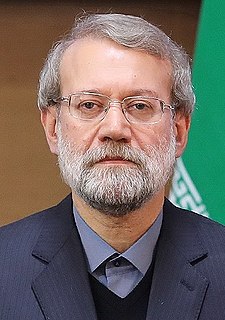A Quote by Henry A. Kissinger
We have to be careful in negotiating with Iran that we don't create the impression among the Arab states and the Sunni states that we are working on a condominium between Iran and the United States, because that will panic them and drive them into making their own arrangement.
Related Quotes
I do believe that the very tense relationship between the United States and Iran presents a challenge to the United States. But to discuss Iran as that type of a threat I find somewhat unconvincing, mindful of the fact that Iran actually doesn't have those military capabilities that would be needed to refer to it as that type of threat.
Since 1981, after our nations severed diplomatic relations, we've worked through a international tribunal to resolve various claims between our countries. The United States and Iran are now settling a long-standing Iranian government claim against the United States government. Iran will be returned its own funds, including appropriate interest but much less than the amount Iran sought. With the nuclear deal done, prisoners released, the time was right to resolve this dispute as well.
It was not the United States who invaded Kuwait; it was Iraq. It was not the United States that went to war with Iran; it was Iraq. It was not the United States that fired chemical weapons at Iran; it was Iraq. And it was not the United States that murdered innocent Iraqi citizens with chemical weapons; it was Iraq.
I want to reassert again the position of the United States that with regards to Iran, we will not allow Iran to develop a nuclear weapon, period. We will not allow them to develop a nuclear weapon, and we will exert all options in the effort to ensure that that does not happen...The United States stands firmly with Israel, and we have a rock solid commitment to the security of Israel and to the security of its citizens.
In the United States, Iran is nothing but a whipping-boy. Few Americans have any real use for Iran. Most of us, what we know and remember about Iran are things like the hostage crisis in 1980, or they think about the Iranian attacks in Lebanon, or on the Khobar Towers. So you don't get a whole lot of political mileage in the United States by going out and advocating better relations with the Iranians.
Iran did not talk to the United States for 35 years. And now we are talking. And I believe these talks are useful. But they haven't produced the intended results. We have not seen an end to the hostility that has been exhibited in the United States against Iran. And I believe it is important that we see some of that.
In the Islamic world, the U.S. is seen in two quite different ways. One view recognizes what an extraordinary country the U.S. is.The other view is of the official United States, the United States of armies and interventions. The United States that in 1953 overthrew the nationalist government of Mossadegh in Iran and brought back the shah. The United States that has been involved first in the Gulf War and then in the tremendously damaging sanctions against Iraqi civilians. The United States that is the supporter of Israel against the Palestinians.
We often forget that Iran has a long tradition and history with the United States. Iranians have been coming to the United States as students for decades. American businessmen were in Iran developing the oil fields. ...There was an American financial advisor to the Iranian government in the early part of the century.
The Iranian government still denies the Holocaust - so you can't take them seriously. And the Israeli government spreads rumours and disinformation about Iran - because it needs to for the creation of panic. I find these theological states - and in this respect, Israel and Iran are twin brothers - very, very dangerous.
Iran is an ancient land, home to a proud culture with a rich heritage of learning and progress. The future of Iran will be decided by the people of Iran. Right now, the Iranian people are struggling with difficult questions about how to build a modern 21st century society that is at once Muslim, prosperous, and free. There is a long history of friendship between the American people and the people of Iran. As Iran's people move towards a future defined by greater freedom, greater tolerance, they will have no better friend than the United States of America.
In the Islamic world, the U.S. is seen in two quite different ways. One view recognizes what an extraordinary country the U.S. is. Every Arab or Muslim that I know is tremendously interested in the United States. Many of them send their children here for education. Many of them come here for vacations. They do business here or get their training here. The other view is of the official United States, the United States of armies and interventions.




























